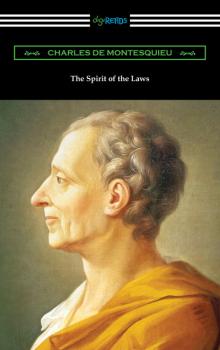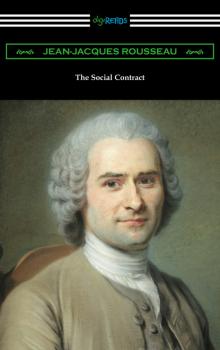ТОП просматриваемых книг сайта:
Зарубежная публицистика
Различные книги в жанре Зарубежная публицистика, доступные для чтения и скачиванияАннотация
"The Prince & Other Writings" gathers Machiavelli's master work with the bulk of his other writing, organized into eight appendices. Machiavelli (1469-1527) became the pre-eminent political philosopher of his era with the release of «The Prince» (1532). In this treatise he examines the role of political power in shaping statehood. His rejection of idealism in favor of realism often enabled his notional ruler to act immorally in order to gain and maintain power. Now firmly situated within the Western Canon «The Prince» ranks among the greatest works of political theory, finding lasting relevance in today's complex political climate. In the appendices we find several letters to important political leaders of Renaissance Italy. The additional text in this edition gives tremendous insight into Machiavelli's thought that helped shape his defining work.
Аннотация
English-American political activist, author, political theorist and revolutionary, Thomas Paine was one of the most influential figures during the period leading up to the American Revolution. Through his hugely influential pamphlet «Common Sense» and the series of pamphlets known collectively as «The American Crisis» he successfully advocated for colonial America's independence from the Kingdom of Great Britain. Those works are included in this collection along with «Rights of Man», «The Age of Reason», and «Agrarian Justice». In «Rights of Man» Thomas Paine responds to Edmund Burke's «Reflections on the Revolution in France» arguing that popular political revolution is permissible when a government does not safeguard its people and their natural rights. Paine became notorious for his «The Age of Reason,» in which he promotes reason and freethinking over the institutionalized doctrine of the Christian religion. Finally in his pamphlet «Agrarian Justice» he discusses the origins of property and introduced the concept of a guaranteed minimum income. In this edition we see a comprehensive collection of Paine's writings providing a window into his logic which heavily influenced early American political theory.
Аннотация
First published in 1922, “Public Opinion” is the fascinating study of the role of citizens in a democracy by Walter Lippmann, an American writer, reporter and political commentator. Lippmann’s notable career spanned decades and produced some of the most important journalism in American history. He was the first to introduce the concept of the Cold War, received many awards, including two Pulitzer Prizes, and wrote thousands of articles and columns, earning him the title of the “Great Elucidator”. “Public Opinion” is Lippmann’s assessment of a functional democratic government and the role that citizens play in the democracy. Lippmann examines the dilemmas presented in revolutionary periods of history and raises doubts on the ability of citizens to effectively govern themselves. He draws important attention to the media’s role in shaping public perceptions and opinions and presciently warns against the power of propaganda. Lippmann’s work exploring modern democracy, how it functions, and what situations most threaten its success have made “Public Opinion” a staple in the field of political science. Lippmann’s work was far ahead of its time in understanding the dangers of propaganda and his conclusions remain relevant and thought-provoking nearly a century later. This edition includes a biographical afterword.
Аннотация
This treatise on political theory, originally published anonymously in 1748, has become one of the most influential works of political science ever written. French philosopher Charles de Montesquieu wrote this piece under the inspiration of such political theorists as René Descartes, Nicholas de Malebranche, and Niccolò Machiavelli. The ideas laid forth by Montesquieu in this work, especially that of balancing power among branches of government, had a prominent influence on the American Constitution, although at the time of its publication was subject to censorship. Over twenty years in the making, “The Spirit of Laws” considers a vast range of political topics including: the preservation of civil liberties, taxation, slavery, commerce, the role of women, crime and punishment, religion, education, morality and the law, and other matters of political, sociological, and anthropological importance. Undoubtedly, it has become one of the most emulated and highly-regarded treatises on political law ever written.
Аннотация
Published in 1960 under the name of Arizona Senator Barry Goldwater, “The Conscience of a Conservative” is a widely influential and important book on the American conservative political movement. While the book was published under Goldwater’s name, it was ghostwritten by L. Brent Bozell Jr., the brother-in-law of William F. Buckley and Goldwater’s speech writer in the 1950s. The book was instantly popular and catapulted Goldwater, a Senator from Arizona when the book was published, into the national spotlight and helped him became the Republican nominee for President in 1964. Bozell’s concise and thorough work details the conservative social and political positions on topics including education, labor unions, taxation, farming and agriculture policies, and civil rights. The book reignited the conservative movement and led to the rise of Reagan-style Republicanism in the 1980s. “The Conscience of a Conservative” defines what it means to be a modern political conservative in a way that is very accessible and understandable and continues to influence American political writers to this day. It remains an essential read for any student of political science and post-war American political history.
Аннотация
This work contains two of Cicero’s most important political writings, “The Republic” and “The Laws”. In “The Republic”, or “On the Commonwealth”, Cicero crafts a Socratic dialogue in six books on the subject of Roman politics. Cicero discusses the history of Roman politics and its constitution, the role of justice in government, the types of constitutions, the role of education, and the ideal citizen in a republic. In “The Laws” we find another Socratic dialogue which discusses the laws and in which Cicero expounds on his theories of natural law and of harmony among the classes. Despite coming down to us in an incomplete state, these books will enlighten the modern reader as to the foundation of Cicero’s political philosophy and give insight into some of the early democratic ideals which form the foundation of western political thought. Presented here are the extant versions of these important political works in translation by C. D. Yonge.
Аннотация
Originally published in two parts in 1791 and 1792, “The Rights of Man” is Thomas Paine’s defense of the French Revolution in response to Edmund Burke’s criticism in “Reflections on the Revolution in France.” A classic work of The Age of Enlightenment, “The Rights of Man” contends that reason should be the foundation of authority and government. Paine argues that any government that fails to protect the natural rights of its citizens should be opposed by political revolution. In accessible and simple language, Paine argues for the profoundly influential, and at that time, radical idea that civil liberties are not privileges granted by governments but arise naturally and belong to the people. Only governments that safeguard these rights are legitimate and should be allowed to exist. Those governments, such as the despotic French monarchy, that fail to do so must be overthrown. This brilliant and persuasive work is a spirited defense of representative government, written constitutions, and social reforms that benefit the working class. Over 200 years later, “The Rights of Man” remains an inspiring treatise on individual liberties and workers’ rights that is a must-read for all who value democracy and personal freedom. This edition includes a biographical afterword.
Аннотация
Thomas Paine, a seminal figure in American History, was an Englishman by birth who immigrated to America in 1774, where he quickly took up the cause of the independence of the American colonies from England. His famous work “Common Sense”, published in 1776, helped to gain public support for the American Revolution and established him as a central figure among the founding fathers. Later, while living in France during the French Revolution, Paine was dismayed by the increasing political radicalism of the revolutionary movement. In response he wrote the first part of “The Age of Reason” in 1794, with two more parts published in 1795 and 1807. In this influential and controversial work, Paine turns his attention to a philosophical examination of Christianity. Paine lays the foundation of his Secularist Deist philosophy and argues that God is real but that the Bible is not the word of God and is merely a human work that is flawed and inaccurate. Paine further contended that Jesus was not divine, rejected belief in miracles, and argued the world was governed by the laws of nature. Paine criticized organized religion as power hungry and corrupt and advocated for religious tolerance and freedom of thought. Accessible, clever, humorous, and far ahead of its time, “The Age of Reason” continues to resonate with readers today. This edition includes a biographical afterword.
The Social Contract (Translated by G. D. H. Cole with an Introduction by Edward L. Walter) - Jean-Jacques Rousseau
Аннотация
Originally published in 1762, “The Social Contract” is Jean-Jacques Rousseau’s treatise on how to best organize politics in the face of commercial society. Rousseau writes, “Man is born free; and everywhere he is in chains.” This statement exemplifies the main dilemma of government, that despite mankind having an inherent natural right to freedom, modern, especially autocratic, governments had gone too far in restricting it. The question which Rousseau is asking within this work is whether or not there can be a legitimate political authority, for as he observed, those of his time seemed to put mankind worse off than they were living by the state of nature which existed before civilization. Arguing against the concept of divine right, Rousseau asserts that true sovereignty exists only amongst the people as a whole. By a mutual agreement to a universal social contract mankind can be free equally as each and everyone agrees collectively to how their rights may be abridged and what societal duty may be placed upon them. The ideas of the “The Social Contract” form the basis for all modern democracies, making it one of the most influential political treatises ever written. This edition includes an introduction by Edward L. Walter and a biographical afterword.
Аннотация
Greek philosopher and scientist, Aristotle, lived in the 4th century B.C. and is thought of as one of the most important figures from classical antiquity. Aristotle was probably the most famous member of Plato’s Academy in Athens, whose writings would ultimately form the first comprehensive system of Western philosophy. His writings were not constrained to simply one field of inquiry but covered such various subjects as physics, biology, metaphysics, logic, ethics, aesthetics, rhetoric, linguistics, politics and government. Contained in this volume is Aristotle’s “Politics”, a treatise dealing with political philosophy. The word politics comes from the Greek word “polis” or city and literally means things concerning the city. Given the smaller populations of ancient times the city was viewed as the highest level of community and thus the most relevant in discussing political concerns. Aristotle’s “Politics” is composed of eight books in which he discusses the politics of the household, different forms of political regimes, the classification and role of citizens, the types of constitutions, the distribution of political power, the ideal state, and education within it. Heavily influenced by Plato’s “Republic” and “Laws”, Aristotle’s “Politics” is one of the most important works on government from classical antiquity. This edition follows the translation of Benjamin Jowett and includes a biographical afterword.










